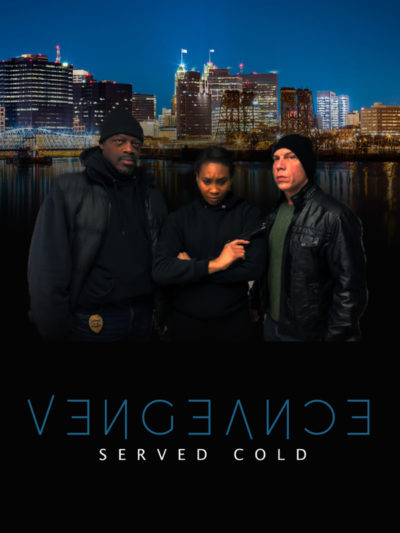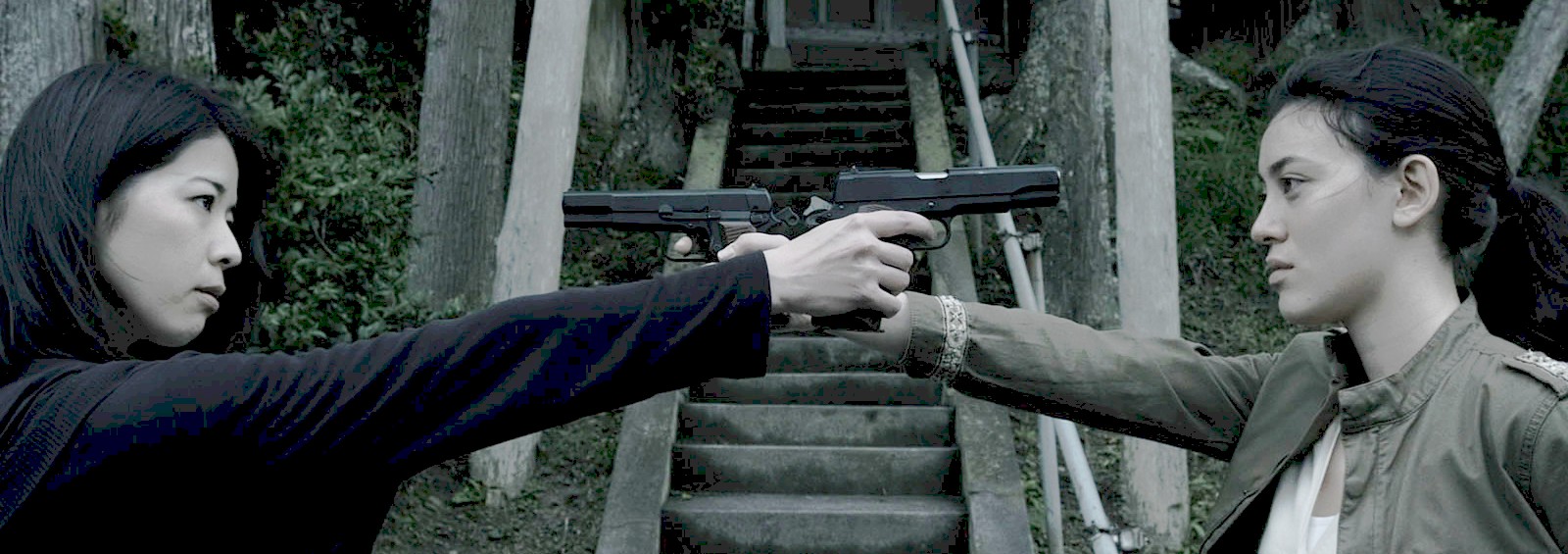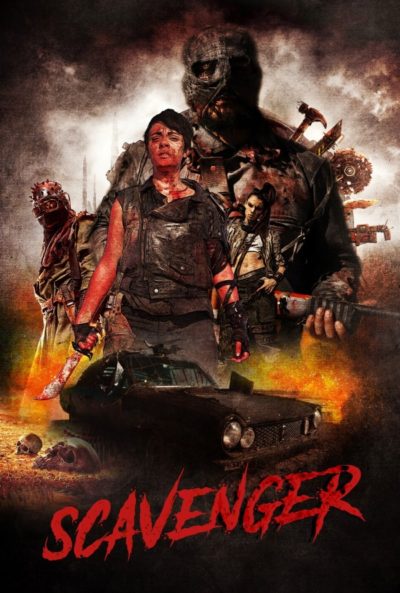★★★
“Just deserts.”
 This is a sprightly and energetic Chinese knock-off, borrowing heavily from Resident Evil and Aliens in particular. There’s a research lab deep underground, in the middle of the Gobi Desert, which has suddenly gone radio silent. The research they were doing there was… well, I’m not 100% certain quite what it involved. While a lot of the dialogue in this is in “English”, I’m using quotes advisedly. Especially on the scientific front, it seems to be more of an enthusiastic word-salad, like “by chance, precise data from the gamma variable appear,” throwing jargon about radiation and DNA splicing into the mix, in lieu of anything coherent. Anyway, it seems Ohm Technology are into some fairly shady shit, to nobody’s surprise.
This is a sprightly and energetic Chinese knock-off, borrowing heavily from Resident Evil and Aliens in particular. There’s a research lab deep underground, in the middle of the Gobi Desert, which has suddenly gone radio silent. The research they were doing there was… well, I’m not 100% certain quite what it involved. While a lot of the dialogue in this is in “English”, I’m using quotes advisedly. Especially on the scientific front, it seems to be more of an enthusiastic word-salad, like “by chance, precise data from the gamma variable appear,” throwing jargon about radiation and DNA splicing into the mix, in lieu of anything coherent. Anyway, it seems Ohm Technology are into some fairly shady shit, to nobody’s surprise.
A group is sent out to find out what happened, and more importantly, bring everything back on line. The only man who can do it, apparently, is Doctor Haven, a kinda autistic super-scientist, who’d like to get his hands on the data. To protect him, three Lara Croft-alikes are assigned: leader Bai Zhi (Yu), the flirty Bi Jiao (Wu); and veteran Gui Che (Xu). Also coming along are a bunch of cannon fodder, and leader of the mission, Principal Gabon (Ger), who is clearly evil because he’s played by a Westerner. They haven’t even reached the base before they encounter the local fauna: scorpions that can swim through human flesh like water. So if you stand on one, it’ll pop out the top of your head.
These are, at least, only normal sized. But when the expeditions enters into the base, the women are appalled to discover this isn’t the rescue mission intended, with any survivors being ruthlessly gunned-down by Gabon’s men. [Those foreign devils…] Turns out he intends to seize the technology and use it for nefarious purposes, but not everyone is in favor of this. The heroic trio rebel, Dr. Haven refuses to get the systems running again, and even some of his own men decide they can’t in good conscience take part in Gabon’s plan. All of which would be merely morally interesting, if it weren’t for the F-sized version of the scorpions roaming the facility due to leakage of gamma rays. Or something.
You’d be hard-pushed to identify anything new or particularly innovative here. But it keeps moving, without significant downtime, and there’s enough background to make it feel more than you’re just watching a video-game. For instance, Bai Zhi is there partly to look for her fiance, who worked at the base before he suddenly vanished. There’s also a lot more interaction between the characters and the monsters than we usually see in this kind of thing. Though the quality of the combination FX is uneven, and the editing of the action is sometimes choppily incoherent. No great matter. This is a film pitting soldiers against freakin’ giant scorpions, and firmly checks the boxes of what you would want and expect from such a production.
Dir: Yun-Fei Lu
Star: Sai-Chu Yu, You-Xuan Wu, Dong-Mei Xu, Dieter Ger
This review originally appeared on Film Blitz.





 When the best part of a movie is the opening credits, we have a problem. That’s the case here, with an 007-influenced montage that feels as if it cost more than the entire rest of the film to put together. However, by that point, the movie was already on thin ice, because the volume of the music was roughly three times that of dialogue in the pre-credit scene. Lunging repeatedly for the button on the remote is always a red flag for any indie movie, and proved accurate here. The same goes for the gratuitous name-checking of much better black heroines, such as
When the best part of a movie is the opening credits, we have a problem. That’s the case here, with an 007-influenced montage that feels as if it cost more than the entire rest of the film to put together. However, by that point, the movie was already on thin ice, because the volume of the music was roughly three times that of dialogue in the pre-credit scene. Lunging repeatedly for the button on the remote is always a red flag for any indie movie, and proved accurate here. The same goes for the gratuitous name-checking of much better black heroines, such as  After enjoying
After enjoying  There are times where I regret my choice of pastime. It means I end up watching things for this site that I would never give the time of day, given the choice. This is one such, having endured the almost physically painful experience which was
There are times where I regret my choice of pastime. It means I end up watching things for this site that I would never give the time of day, given the choice. This is one such, having endured the almost physically painful experience which was  At the age of fifteen, Madison Michaels saw her prostitute mother beaten and killed by Renegade (Cross), a vicious local pimp. His homicide goes unpunished. Ten years later, Madison (Linton) is a counsellor, trying to help drug addicts and hookers get off the streets. She discovers that Renegade is still abusing women, and gets no help from the police, with Detective Straker (Williams) saying he can do nothing based on her hearsay. Against the advice of her friends and sister Lydia (Jeffries), Madison hatches a plan to take the pimp down, and clean the streets of thus piece of scum. Naturally, it doesn’t initially go quite as planned, with the trap set for Renegade backfiring, followed by betrayal from an unexpected direction.
At the age of fifteen, Madison Michaels saw her prostitute mother beaten and killed by Renegade (Cross), a vicious local pimp. His homicide goes unpunished. Ten years later, Madison (Linton) is a counsellor, trying to help drug addicts and hookers get off the streets. She discovers that Renegade is still abusing women, and gets no help from the police, with Detective Straker (Williams) saying he can do nothing based on her hearsay. Against the advice of her friends and sister Lydia (Jeffries), Madison hatches a plan to take the pimp down, and clean the streets of thus piece of scum. Naturally, it doesn’t initially go quite as planned, with the trap set for Renegade backfiring, followed by betrayal from an unexpected direction.  I had quite forgotten that Rose was part of John Wick: Chapter 2 in 2017. That
I had quite forgotten that Rose was part of John Wick: Chapter 2 in 2017. That  ★★
★★ This should be right up my alley. For it’s a grungy, post-apocalyptic story of revenge, which is heavy both on the carnage and the nudity. Throw in disapproving reviews containing lines like, “Downright nasty movie that takes all the worst bits of exploitation cinema and proudly puts it on display,” or “Scavenger is truly appalling,” and you’ll understand why it was fast-tracked for viewing. However, the weird thing is… those reviews aren’t wrong – it is a bad movie, just not for the reasons they espouse. The bigger problem is simply poor execution, in a way that manages to take the sex ‘n’ violence, and make it all painfully dull. Of all the cinematic sins, that’s one I find hard to forgive.
This should be right up my alley. For it’s a grungy, post-apocalyptic story of revenge, which is heavy both on the carnage and the nudity. Throw in disapproving reviews containing lines like, “Downright nasty movie that takes all the worst bits of exploitation cinema and proudly puts it on display,” or “Scavenger is truly appalling,” and you’ll understand why it was fast-tracked for viewing. However, the weird thing is… those reviews aren’t wrong – it is a bad movie, just not for the reasons they espouse. The bigger problem is simply poor execution, in a way that manages to take the sex ‘n’ violence, and make it all painfully dull. Of all the cinematic sins, that’s one I find hard to forgive. Paramedic Melina (Sila) regains consciousness to find herself in the back of her ambulance, along with her patient, Franson (Loranger), and the rest of the crew in various states of health. The vehicle had gone off the road and fallen into a ravine, along with the accompanying police car. It turns out they were transporting Franson and another prisoner to hospital when the crash took place – and it quickly becomes apparent that what happened was far from an accident. A posse of camo-clad hunters close in on them, led by Caine (Gray). Their mission to make all the vehicle’s occupants, both criminal and otherwise, pay for the sins of their pasts. They’ve brought with them the wronged parties in question, to exact bloody revenge.
Paramedic Melina (Sila) regains consciousness to find herself in the back of her ambulance, along with her patient, Franson (Loranger), and the rest of the crew in various states of health. The vehicle had gone off the road and fallen into a ravine, along with the accompanying police car. It turns out they were transporting Franson and another prisoner to hospital when the crash took place – and it quickly becomes apparent that what happened was far from an accident. A posse of camo-clad hunters close in on them, led by Caine (Gray). Their mission to make all the vehicle’s occupants, both criminal and otherwise, pay for the sins of their pasts. They’ve brought with them the wronged parties in question, to exact bloody revenge. This is not to be confused with the rather higher profile i.e. it’s available on Netflix, Japanese film with the same title, made the same year, and covering a not dissimilar theme. Both are about a woman who is prepared to commit murder, in order to save their best friend from an abusive relationship. However, after the killing in question, the films take divergent paths. The Japflix version becomes a road-trip movie, with the killer and her friend going on the run. This, however, focuses heavily on the killer, whose already fragile mental state falls apart completely, after she discovers that things weren’t quite as she had been led to believe. It’s not her first time at the homicide rodeo either.
This is not to be confused with the rather higher profile i.e. it’s available on Netflix, Japanese film with the same title, made the same year, and covering a not dissimilar theme. Both are about a woman who is prepared to commit murder, in order to save their best friend from an abusive relationship. However, after the killing in question, the films take divergent paths. The Japflix version becomes a road-trip movie, with the killer and her friend going on the run. This, however, focuses heavily on the killer, whose already fragile mental state falls apart completely, after she discovers that things weren’t quite as she had been led to believe. It’s not her first time at the homicide rodeo either.